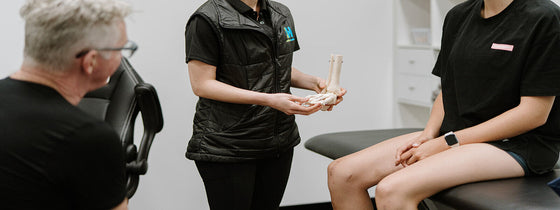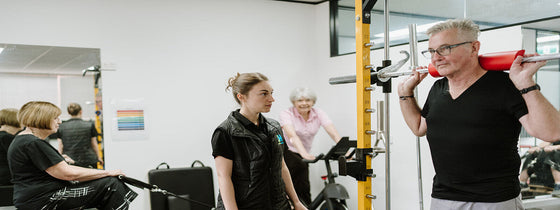Life is best lived strong. The risk of injury is lower, recovery from injury is often maximized and people just generally feel good when they are stronger. It is this philosophy, and piles of scientific evidence backing up this simple fact, which saw Group Physiotherapy classes running at OHL since day one! Yet, have you ever wondered why we call the room a Strength Lab and not a gym? Or a clinical pilates studio? Or rehab room?
Clinical Pilates is a method of strengthening loved by the educated medical world and it has such amazing success in rehabilitating a patient’s strength safely. Clinical Pilates equipment, like reformers and trapeze tables, are versatile for practitioners to use and fun for patients to exercise on. OHL boosts a talented physiotherapy team to teach our Clinical Pilates program and you can be transitioned into this program after an individualized an assessment and goal-setting session.
We challenge the stigma of Clinical Pilates being a feminine method of strengthening, and we promise any men considering joining that our program that it is fun, it is a hard workout and it has fairly equal gender participation statistics. Men do really do Pilates! Clever men keep strong safely and they don’t lose time being injured!
Our program also boasts an inclusive family-friendly feel with certain classes being open to parents and grandparents bringing their little loved ones along. While the kids quietly play on the mat, their parents get the opportunity to work out safely with our physiotherapy and exercise team. No excuses for accessibility if you want to keep strong here at OHL.
Although there is plentiful evidence for Clinical Pilates, today’s evidence-based sports and rehabilitate medicine continues to teach and remind us about the importance of functional movement training. Squatting, lunging, lifting, jumping, hopping and deadlifting are all integral movements for day-to-day life, and often need to be practiced when returning from injury. For example, squatting with a barbell is not a risky movement when taught and performed well. Squatting is an awesome exercise for optimizing the slings of muscle wrapping around our body, just like deadlifts, thoracic rotation work and pull ups, and so they are incorporated into our programming.
Keeping the functionality factor in mind, OHL created a ‘Strength Lab’ incorporating both Clinical Pilates and functional resistance training equipment in one room. This on-site room houses reformers, leg press, non-motorised treadmill, squat racks, spin bikes, trapeze table, free weights, TRX, leg bench, agility ladders, plyometric toys and even more equipment for our physiotherapy expert to use our classes. Can you imagine the variety of classes that will run in this room!? Our physiotherapy team are always open to new clients joining our Group Physio class schedule by booking with a Group Physio class assessment. We also highly recommend current clients engage in a Group Physio reassessment every 6months to ensure we are truly individualising to each client’s needs, goals and likes!
If you want to know more, or simply want to check out our expansive Group Physio timetable, please check out our website (where you can also book online) or you can contact our reception team to book your initial assessment on 9431 5955.

OHL is integrating a new athletic screening assessment into its practice to further enhance our community's sporting ability. This screening assessment combines range of motion, strength profiling, force deck analysis, and subjective training status to give athletes a comprehensive performance snapshot. By establishing a baseline and identifying key areas for improvement, we can tailor your training to enhance performance, provide insight on key metrics, and stay resilient throughout the season. Whether you're preparing for preseason, managing midseason demands, or simply aiming to train smarter, this assessment delivers the data-driven insights you need.

If you're experiencing back or neck pain with neurological signs and symptoms, a thorough neurological examination is crucial for accurate assessment and effective treatment. In this Optimal Tip learn more about what we mean by completing a neurological exam!

Squats, deadlifts, and calf raises are key movement patterns that should be part of every strength and conditioning program—regardless of age and activity level. These functional movements support joint health, improve posture and balance, and reduce the risk of injury while building strength where it matters most.